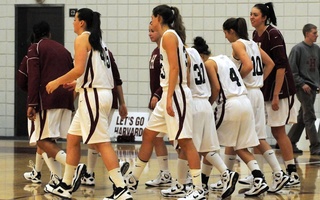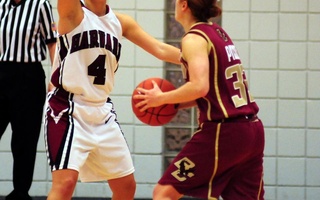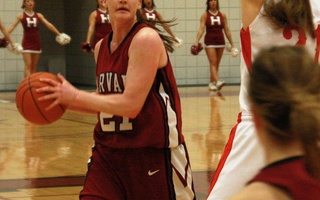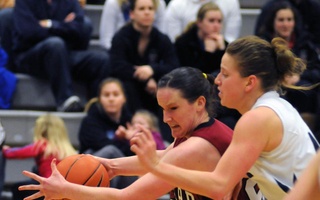
All-Ivy forward junior Emma Markley averaged 14.0 points, 7.1 rebounds, and 2.7 blocks per game—all bests for Harvard this season.
28 seasons, 11 Ivy League titles, 6 NCAA tournament appearances.
With those numbers, coach Kathy Delaney-Smith has undoubtedly elevated the Harvard women’s basketball program to new heights.
At the beginning of this season, the Crimson fielded a team comprised entirely of underclassmen, yet the expectations to win the team’s 12th Ivy League title remained the same.
“We were trying to keep up with the tradition of Harvard, and that’s winning the Ivy championship,” junior co-captain Christine Matera said. “We knew that there would be obstacles and that we would have to grow over the course of the season...We expected everybody to grow up faster and contribute a little earlier.”
With the bar set high, Harvard (20-9, 11-3 Ivy) certainly exceeded opponents’ expectations this season with a strong second-place finish in the Ivy League. While the Crimson fell just short of an Ivy title for the second straight year—this time at the hands of Princeton—the team garnered its second consecutive WNIT berth.
“To be honest, I fully expected us to contend for the title, and I fully expected us to win the title,” Delaney-Smith said. “We had enough talent to win, and with players like [junior] Emma [Markley] and [sophomore] Brogan [Berry], I thought we had enough experience to build around. But I think we were just one or two players short depth-wise, and injuries really took a toll on us.”
With the dominance of All-Ivy forward Markley inside the paint and the sharp-shooting of Matera, the Crimson certainly had plenty of options to score offensively, with four players—Markley, Matera, Berry, and freshman forward Victoria Lippert–averaging more than 10 points a game.
“Offense is definitely our strength,” Matera said. “We’re very well-rounded offensively, and we know how to share the ball.”
In particular, the emergence of Lippert provided Harvard with a versatile scoring threat. Her strong freshman campaign earned her second-team All-Ivy honors.
“I feel that Victoria is getting much better,” Delaney-Smith said. “She’s a kind of kid who can dominate the game, particularly on offense, and she can score on offense 30 different ways.”
The Crimson’s offensive attack was on full display in its first game of the season, an 82-81 upset victory over crosstown rival Boston College. More importantly, though, the win gave the team the confidence it needed to make an Ivy title run.
“The BC game really set the tone for the rest of the season,” Matera said. “That was a huge win and got us off on the right foot from the get-go.”
But with an injury to junior co-captain and forward Claire Wheeler halfway through the season, Delaney-Smith was forced to play even more of her younger players. And while rookies Miriam Rutzen and Lippert played admirably on the court, the lack of intangibles such as leadership and team chemistry eventually caught up with Harvard, costing the team a couple of crucial conference games.
“In the first Princeton game, we were up by 10, but once [Princeton] started hitting some threes, that’s when you expect your synergy and leadership to come in,” Delaney-Smith said. “For us, it didn’t kick in, and we lost our confidence.”
“When you bring in a large class like our freshmen, chemistry does not automatically happen,” Delaney-Smith added. “It’s a process that you work on every day on the court and off the court.”
Yet the Crimson kept on finding ways to win, notching victories in eight consecutive league games before falling to Princeton, 78-66, at the end of the season.
While Harvard’s offensive prowess was instrumental in keeping the Crimson in contention for a title, Delaney-Smith attributed the team’s shortcomings in defense and rebounding as the main reason for finishing in second place.
“I tried seven different things this year [for rebounding and defense]...but all the talk and drills in the world just aren’t doing it,” Delaney-Smith said. “We got better, but I still don’t have three legitimate rebounders on the team. I have two. We had stretches in several games where we were the best-defending team I’ve ever coached, so it isn’t that we don’t know how [to rebound and defend], it’s just not our mindset.”
Harvard will remain an offensive threat to conference opponents next season, but Delaney-Smith asserted that it will be other aspects of the game that will determine the Crimson’s success.
“The defense and rebounding–not offense–will dictate whether we win a title next season,” she said.
—Staff writer Kevin T. Chen can be reached at ktchen@fas.harvard.edu.
Read more in Sports
SEASON RECAP: Mixed Bag for Men’s SquashRecommended Articles
-
 Another Run for the Crown
Another Run for the Crown -
 Crimson Sweeps Massachusetts Teams with Win over Minutewomen
Crimson Sweeps Massachusetts Teams with Win over Minutewomen -
Unprepared Crimson No Match for PrincetonIt is no easy feat for a basketball team to beat two opponents by double digits in the course of a week. But it’s even harder to maintain that dominance and consistency heading into the next game.
-
 Lippert’s Career High Brings Victory
Lippert’s Career High Brings Victory -
 Matera Hits Late Three To Give Crimson A Win
Matera Hits Late Three To Give Crimson A Win -
 Loss Against Princeton Terminates Harvard’s Title Hopes
Loss Against Princeton Terminates Harvard’s Title Hopes













